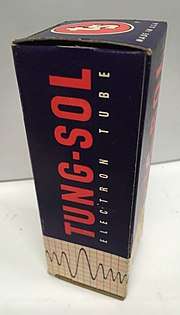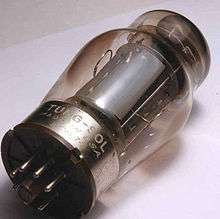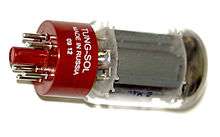Tung-Sol
Tung-Sol was an American manufacturer of electronics, mainly lamps and vacuum tubes.[1][2][3][4]


History
Tung-Sol was founded as Tung-Sol Lamp Works Inc. in Newark, New Jersey in 1907. Their early products were mainly geared towards the automotive market and included headlamps, pilot lights, and flashlight bulbs.[1]
The trade name was formed from the first syllable of "tungsten" and the Latin word "sol" meaning sun.
The company entered the electronics field in the 1920s. In time they established themselves as leaders in the development and production of vacuum tubes, with their main competition including RCA and Sylvania. By 1951, they began doing business as Tung-Sol Electric Inc. Soon after, they were acquired by Wagner Electric, which itself merged into Studebaker-Worthington in 1967.[3] Tung-Sol was also active in the semiconductor industry, with its transistors being easily recognizable by their sky blue color.[2]
Tung-Sol was privately held and run like a laboratory. This gave Tung-Sol vacuum tubes a reputation of having some of the best metallurgy and chemistry in actual production.[4] The Tung-Sol brand name is now owned by the New Sensor Corporation, the same company that owns the brands Sovtek and Electro-Harmonix.[5]
Products


Tung-Sol developed the first successful car headlight in 1907, followed in 1913 by a single bulb two filament high and low beam headlight. Other Tung-Sol inventions included the flashing turn signal.[3] Tung-Sol created the 6550 vacuum tube, a specialized Hi-Fi audio tube in 1954.
6550
The 6550 is a beam tetrode vacuum tube introduced by Tung-Sol in 1954 for application as an audio frequency power amplifier.[6][7]
Based on the 6L6 vacuum tube, the 6550 was designed to have higher output power and better stability. It operates with a maximum plate voltage of 600VDC, a screen voltage of 400VDC, and plate dissipation of 35 watts.[8] The KT88, KT90, and 6550, although not identical, are often interchangeable, dependent on external circuit parameters. The 6550's glass envelope was originally wider in the middle than at the top and bottom, but a straight-sided design was later introduced by GE and Philips.[9]
The 6550 continues to be manufactured in the 21st century, as it is used by companies like Marshall and Ampeg in amplifiers for electric guitar and for bass, and in certain Leslie speaker systems.
References
- "TUNG-SOL". pax-comm.com. Retrieved 2016-02-07.
- "Brand History". www.transparentsound.com. Retrieved 2016-02-07.
- (NJ), Tung-Sol Electric Inc.; Newark. "Tung-Sol Electric Inc.; Newark manufacturer in USA, Tube". www.radiomuseum.org. Retrieved 2016-02-07.
- The History of Tung-Sol
- The New Sensor Corporation
- Tung-Sol Electric, Inc., Electronics, McGraw-Hill, vol. 27, no. 11, Nov. 1954, p. 112 insert
- Tung-Sol Electric, Inc., Audio Engineering Music Sound Reproduction, Radio Magazines Inc., vol. 38, no. 12, Dec. 1954, p. 15
- "KT88 and 6550 Directory". www.jacmusic.com. Retrieved 2016-02-07.
- "6550 Tube Types". www.boiaudioworks.com. Retrieved 2016-02-07.